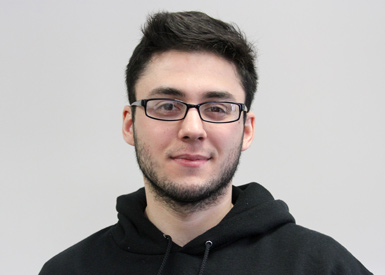
“I found a good mix of affordability and small class sizes at Manhattan University. I like that all the classes here are under 30 people. I like that my professors know me on a first-name basis. I like that I can go to their office hours at any time, and they're always very welcoming.
"I started as a computer engineer because I’ve always liked technology, but I didn't know if I wanted to be in computers full-time. So I switched over to the business side, and eventually I settled on marketing and the new business analytics co-major. It was a really nice mix for me because it factored in the technology that I had always liked when I was younger, with business, which I find really interesting, and good career opportunities.
"The two majors are strong complements. The way I've always thought of it is that marketing is a soft major and business analytics is a hard major. That’s not to say marketing is easy, but to say that I think coupling a more social science-based major like marketing or management with something that's statistics-based like business analytics or finance, gives employers a really attractive candidate, because you know both the human side and the numbers side. That's becoming increasingly important. If you look at the Bureau of Labor Statistics, growth in the field of marketing research is huge. It's rated as one of the fastest growing fields. I think this dual major has a lot of applicability to anything in business, and it gives you tons of options.
"High school was easy for me, but I wasn't always challenging myself as much as I should have been. In my sophomore year at Manhattan, I became a Jasper Summer Research Scholar. I worked with Dr. Poonam Arora, who really really pushed me to learn new things and to work harder than I ever had before. It’s the best thing I've done for my career so far, and it's paying off now in the job interviews I have. Manhattan fosters this kind of teamwork because it's a small university and it's easy to speak to professors.
"Our research was based on behavioral economics and decision-making. We did one really interesting project on hurricanes, and the implication that experience with hurricanes has on future preparedness.
"I’ve also had two Fortune 500 internships during college. I worked at Sherwin Williams as a marketing analyst and I worked at Express Scripts, which is a very large Fortune 20 pharmacy benefits management company. I was a business analyst intern, and I worked in the government programs group. One of the projects I was assigned to is called Co-pay Assistance, where we tried to get buy-in from pharmaceutical companies to give rebates or lower drug costs to people who are experiencing financial hardships.
"Another experience I enjoyed was competing in Manhattan’s first ever Business Analytics Competition last year. In class, you have the opportunity to do a few cases studies, but you don't really have this year-long time frame that we spent on this project. We worked with a massive data set that had tens of thousands of entries. This is where business analytics really came in handy, because we had to dig down deep and find trends and patterns in the data. It was great learning experience. It hones your presentation skills, and it helped me a lot with the way I view data. When you're presented with a problem in this competition, you really can't go to the professor and ask how to do it. You kind of figure it out on your own, and that’s the best way to learn.”
